By Type (6)
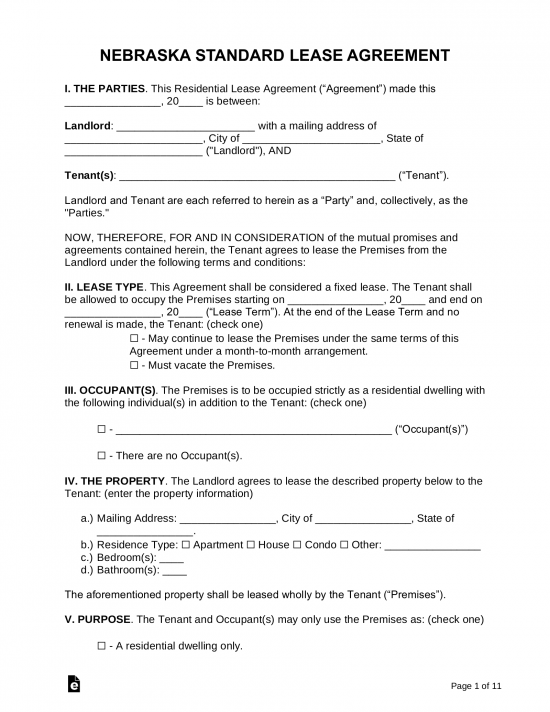 Standard Residential Lease Agreement – For a fixed term, usually one year, between a landlord and tenant for any type of livable dwelling. Standard Residential Lease Agreement – For a fixed term, usually one year, between a landlord and tenant for any type of livable dwelling.
Download: PDF, MS Word, OpenDocument |
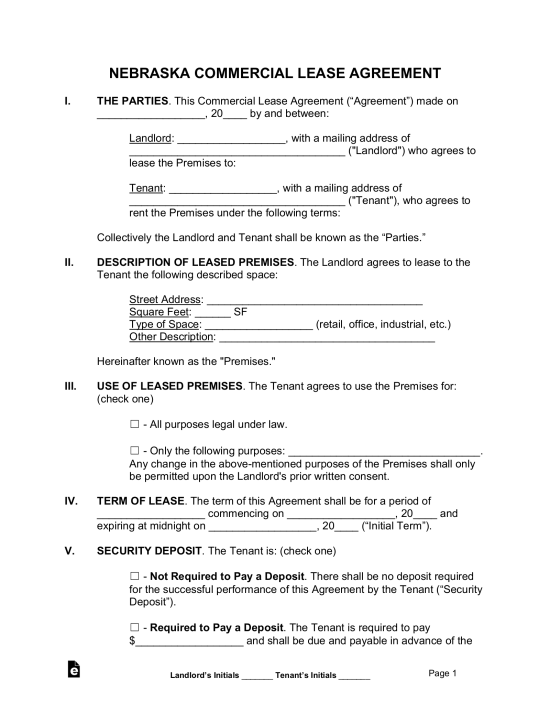 Commercial Lease Agreement – For renting a property that will be used as a business. Commercial Lease Agreement – For renting a property that will be used as a business.
Download: PDF, MS Word, OpenDocument |
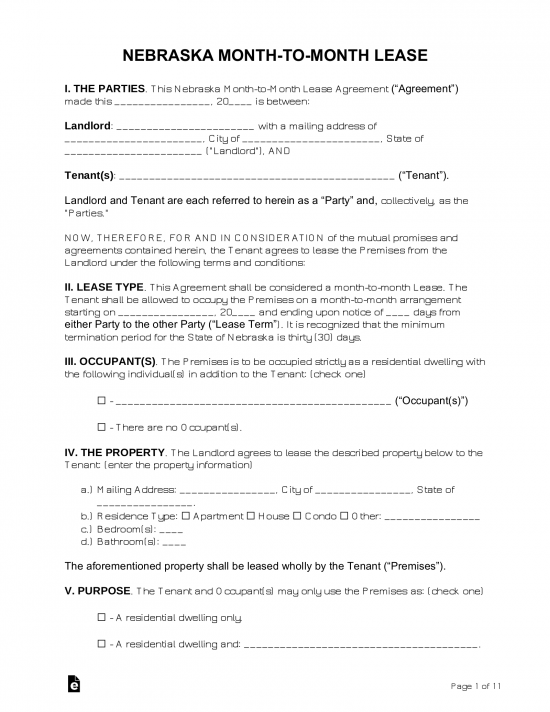 Month-to-Month Lease Agreement (§ 76-1416) – Also referred to as a tenancy at will and can be terminated with at least 30 days’ notice. Month-to-Month Lease Agreement (§ 76-1416) – Also referred to as a tenancy at will and can be terminated with at least 30 days’ notice.
Download: PDF, MS Word, OpenDocument |
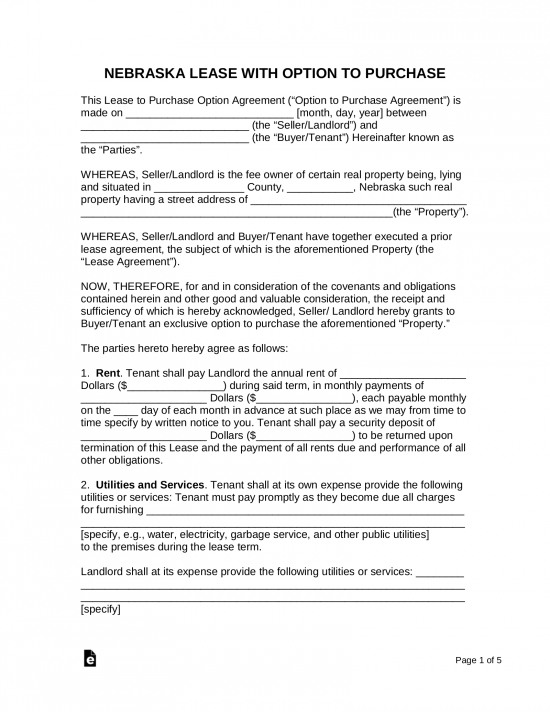 Rent-to-Own Lease Agreement – A standard contract with an added provision that lets the tenant purchase the home at their request. Rent-to-Own Lease Agreement – A standard contract with an added provision that lets the tenant purchase the home at their request.
Download: PDF, MS Word, OpenDocument |
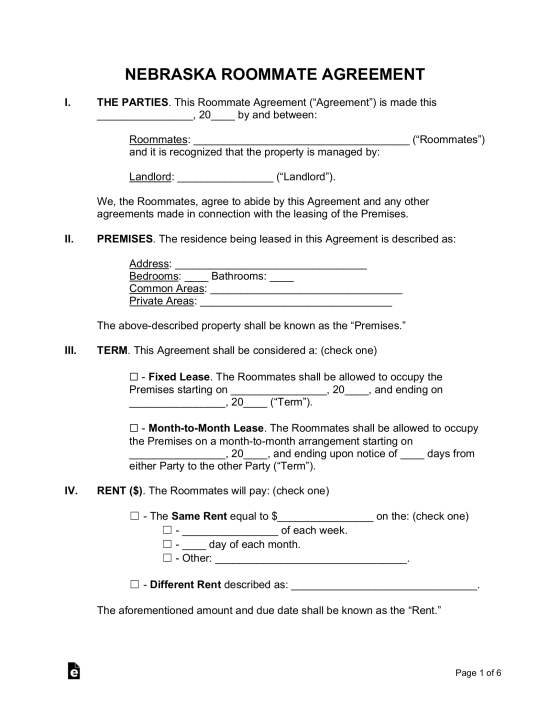 Room Rental (Roommate) Agreement – A shared living situation that creates rules for how the common areas shall be maintained along with who is responsible for which expenses. Room Rental (Roommate) Agreement – A shared living situation that creates rules for how the common areas shall be maintained along with who is responsible for which expenses.
Download: PDF, MS Word, OpenDocument |
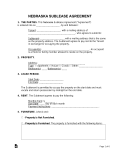 Sublease Agreement – The act of renting space that is already under agreement by a tenant. Sublease Agreement – The act of renting space that is already under agreement by a tenant.
Download: PDF, MS Word, OpenDocument |
Required Disclosures (2)
- Identity – The landlord must disclose in their contract all persons allowed to enter the premises, as well as an official address for notices.[1]
- Lead-Based Paint Disclosure & EPA Pamphlet – Per federal law, all landlords/managers of residential units constructed before 1978 must inform their tenants of the hazardous material located within the layers of paint.
Security Deposits
Maximum Amount – The landlord may request up to one month’s rent for a security deposit.[2]
Collecting Interest – The landlord is not required by Nebraska state law to collect or pay interest on a tenant’s security deposit.
Pet Deposit – If the landlord requires a pet deposit, it cannot be more than a quarter of the monthly rent.[2]
Returning – The security deposit, minus any amount withheld to cover the costs of damages or unpaid rent, must be returned to the tenant within 14 days of the end of tenancy.[3]
- Itemized List – If any amount of the security deposit is withheld to cover the costs of damages, the landlord must provide the tenant with a written itemization of the withheld amounts within 14 days.[3]
When is Rent Due?
Grace Period – Nebraska state law does not establish a grace period for the late payment of rent; rent is due on the date mentioned in the lease.[4] If rent is not paid on the due date, the landlord can issue a seven-day notice to quit.[5]
Maximum Late Fee – There is no law or statute regarding late fees in Nebraska. However, if the landlord charges a fee for the late payment of rent, it must be mentioned in the lease.
NSF Fee – $10 is the maximum fee that the landlord can charge for a bounced check by a tenant.[6]
Withholding Rent – If the landlord fails to supply running water, hot water, heat, or other essential services to the unit, then the tenant may pay to procure these services on their own and deduct the cost from the rent.[7]
Right to Enter (Landlord)
Standard Access – Unless it is impractical to do so, the landlord must give the tenant 24 hours’ notice before entering the unit for any non-emergency reason.[8]
Immediate Access – The landlord is not required to give notice or seek the tenant’s consent to enter the property during an emergency.[9]
Abandonment
Absence – The landlord may require the tenant to give notice in advance of any extended absence in excess of seven days.[10] If the tenant fails to give notice of such an absence, the landlord may recover actual damages from the tenant.[11]
Breaking the Lease – A tenant who is a victim of domestic violence, or whose household member is a victim, may obtain a release from the rental agreement by providing written notice and documentation of a protective order to the landlord.[12]
Tenant’s Utility Shutoff – If the tenant fails to maintain the premises in a way that affects health and safety by shutting off the utilities, then the landlord may give 14 to 30 days’ notice to quit, depending on whether this is the tenant’s first offense.[13]
Unclaimed Property – If personal property remains on the premises after the lease has terminated, the landlord must provide written notice to the tenant that they must retrieve the property within 7-14 days, depending on how the notice was delivered.[14] The landlord is not required to place the unclaimed property in storage.[15]
